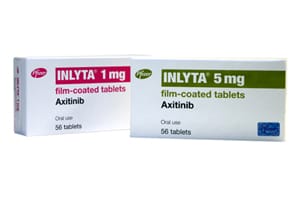
More patients in the UK have a chance of getting access to Pfizer’s oncology drug Inlyta via the NHS after a change of heart by the National Institute for Health and Care Excellence (NICE).
NICE recommended against making Inlyta (axitinib) available to treat advanced kidney cancer on the NHS in March 2013. However, after an appeal by Pfizer – as well as medical and patient groups – it has reconsidered and issued draft guidance backing use of the drug in adults with kidney cancer who have failed first-line treatment.
The Royal College of Physicians, James Whale Fund for Kidney Cancer and Kidney Cancer UK all lent their weight to the drugmaker’s appeal, which has been partially upheld.
The European Medicines Agency approved Inlyta for use after failure of treatment with a tyrosine kinase inhibitor – Pfizer’s own Sutent (sunitinib) or GlaxoSmithKline’s Votrient (pazopanib) – or a cytokine in 2012, and its global turnover has grown quickly to reach $319m last year, with $77m of that total coming from Europe.
The director of NICE’s Health Technology Evaluation Centre, Prof Carole Longson, said the agency had issued “an updated scope and matrix to include sunitinib and pazopanib as comparators in addition to best supportive care for the post-cytokine sub-group”.
Pfizer also submitted additional data on Inlyta’s use in these patients, and as a result “the independent Appraisal Committee concluded that axitinib should be recommended as a treatment option for adults with advanced kidney cancer in specific circumstances,” added Prof Longson.
Pfizer has also negotiated a patient access scheme with the Department of Health that includes an undisclosed discount on Inlyta’s price.
Ben Osborn, head of Pfizer Oncology UK, said the draft guidance “is a positive step towards ensuring that for the first time, patients in England, Wales and Northern Ireland will be able to have routine access to this advanced kidney cancer treatment.”
Patients in Scotland have had access to Inlyta since it was approved by the Scottish Medicines Consortium (SMC) last November.
Osborn said, however, that the UK lags behind other European countries in the use of innovative cancer medicines.
“We hope that this marks a change in approach from NICE towards more pragmatic assessments of medicines, which will lead to NICE saying ‘yes’ more often,” he added.




